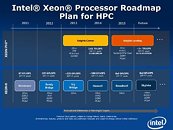Over_Lord
News Editor
- Joined
- Oct 13, 2010
- Messages
- 764 (0.15/day)
- Location
- Hyderabad
| System Name | BAH! - - tHE ECo FReAK |
|---|---|
| Processor | Athlon II X4 620 @ 1.15V |
| Motherboard | ASUS 785G EVO |
| Cooling | Stock |
| Memory | Corsair Titanium 4GB DDR3 1600MHz C9 |
| Video Card(s) | Sapphire HD5850 @ 1.049v |
| Storage | Seagate 7200.12 500GB |
| Display(s) | BenQ G2220HD |
| Case | Cooler Master Elite 334 |
| Audio Device(s) | Onboard |
| Power Supply | Corsair VX550W |
| Software | Windows 7 Ultimate x64 |
Intel's first chips based on the company's new, and Industry first, 14-nanometer manufacturing process are expected to hit markets in late 2015. With Skylake, Intel will introduce their new 9th-generation Intel HD IGP. The new platform will be the first to bring dual-channel DDR4 memory support. Skylake won't be the first platform to support DDR4 memory. In the 2H of 2014, Intel will launch their enthusiast grade Haswell-E platform, with support for quad-channel DDR4 memory. Skylake will be more of an evolution of Broadwell, which in turn is essentially an die shrink of Haswell to 14nm.
Additionally, the new mainstream platform will bring in support for PCI-E 4.0, essentially doubling the bandwidth offered by the current PCI-E 3.0 standard. More powerful GPUs from NVIDIA and AMD should be able to take advantage of the improved bandwidth, as their cards keep getting more and more powerful with each passing generation. Skylake will also introduce support for SATA Express. The advantage? SATA Express allows for a max bandwidth of about 16 Gb/s, more than 2.5x the 6 Gb/s bandwidth offered by the current SATA standard. While the product slide doesn't specify exactly as to when the first Skylake based products are scheduled to hit the market, our best guess places it at the end of 2015.

View at TechPowerUp Main Site
Additionally, the new mainstream platform will bring in support for PCI-E 4.0, essentially doubling the bandwidth offered by the current PCI-E 3.0 standard. More powerful GPUs from NVIDIA and AMD should be able to take advantage of the improved bandwidth, as their cards keep getting more and more powerful with each passing generation. Skylake will also introduce support for SATA Express. The advantage? SATA Express allows for a max bandwidth of about 16 Gb/s, more than 2.5x the 6 Gb/s bandwidth offered by the current SATA standard. While the product slide doesn't specify exactly as to when the first Skylake based products are scheduled to hit the market, our best guess places it at the end of 2015.

View at TechPowerUp Main Site
Last edited by a moderator:










